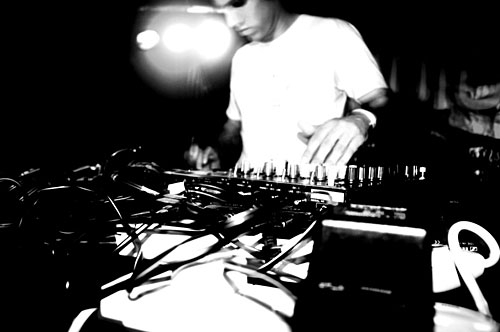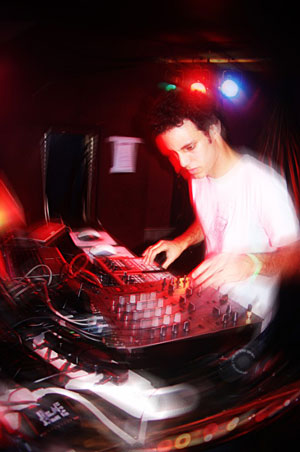Four Tet
This interview was originally printed in the 2005 programme for Oxford’s annual musical event Audioscope.

AUDIOSCOPE is just one date on Four Tet’s biggest tour yet. Stuart Fowkes caught up with Kieran on the eve of the tour to talk about charity shows, live performance and why one of his biggest influences is jazz…
Everything about Kieran’s fourth album under the Four Tet banner, Everything Ecstatic, is bursting with a zest and vigour that sets it apart from so many dour electronica contemporaries. The decision to put together a record full of joy was made at the very outset, he says: ‘I wanted to make something that would make people want to run around in the streets and celebrate. I’ve been listening to a lot of gamelan music, religious music and free jazz, and wanted to infuse the record with the kind of passion I found there, and create something with a sense of ambition. The energy of gospel music is incredible, with that feeling that the singers are communicating directly with God, or with people not on this planet. I wanted Everything Ecstatic to convey the celebration of the potential for euphoria that music has.’
An accusation often levelled at electronica artists (albeit usually by the sort of people who can’t really get their heads around electronic music in the first place) is that it’s all just a few blokes with laptops, and can’t possibly amount to an exciting live show. Kieran is, understandably, quick to defend his position. ‘People performing behind laptops doesn’t have to be boring, so long as you believe you’re doing something musically challenging. I’m a huge jazz fan, and that really informs the way I play live. Jazz musicians would create something on a record, then push it and explore it live, varying the melodies and themes until they eventually ended up with something completely different. If you look at some of the recordings of the same Coltrane track over a period of years, for instance, the journey between the two recordings means that two versions of the same track are almost completely different. By the time Audioscope comes around, I’ll have been on tour for six or seven weeks, so who knows what I’ll end up playing?’
Domino’s limited CD-R release Live in Copenhagen provided some insight into how Kieran approaches his live shows – fragments of recognisable melodies from album tracks build and develop into extended remixes, with some songs going off at such a tangent that they’re scarcely recognisable. As Kieran explains, his tunes are far from set in stone: ‘What’s on my albums is just the starting point for those tracks as they sounded at a given point in time – over the course of a tour, they might change completely. Rounds was the first album I really toured properly, so the new album is informed by the live performances of the material from Rounds over the last year or so.’
How live exactly is the Four Tet live show? The simple answer is ‘completely live’, it would seem: ‘I use two computers, a sampler with trigger pads and a mixer with a built-in sampler, and every show really is completely different. I might start with a prepared drum loop, or a bassline or main theme from one of my tracks, and then drop bits in, sample myself live, create live loops and just see where it takes me.’ For live inspiration, Kieran looks to an earlier wave of electronica artists who were constantly breaking new ground: ‘I remember seeing Aphex Twin when I was 18, on stage with a troop of people dressed as teddy bears and just being incredibly excited, thinking this was real ‘next level’ stuff which could change everything. But that first wave of amazing innovators has been followed by a wave of people who don’t seem to putting themselves forward with confidence, and who haven’t continued to innovate. I was a teenager when drum ‘n’ bass really kicked off, and I found two-step garage really exciting too – just to hear people developing what was really ‘new’-sounding music. ‘

Things seem to have gone quiet over the last couple of years for Fridge, the gorgeous post-rock outfit featuring Kieran and Domino labelmate Adem Ilhan. Does the success of Four Tet and Adem’s solo record mean we’ve seen the last of them? Apparently not, says Kieran: ‘Fridge has been on hold for a couple of years – we’ve been doing it since we were fifteen, so it wasn’t strange to us to take a break from it to do other things. But we’ve started on rough recordings for a new record, and we’re aiming to get these finished and get an album out some time next year. Four Tet has given me so many great opportunities over the last couple of years that it seemed silly not to take them up. It’s been a rollercoaster and I’ve been having a lot of fun seeing where it takes me, but I may take a break next year to catch up on other things.’
So Four Tet’s been something that’s been spurred on by its own success? ‘Yes – to be honest, if the reaction the Four Tet stuff got hadn’t been so good, I probably wouldn’t have carried on with it, but it made me think ‘hang on, I might be quite good at making music with a computer’. Four Tet was originally meant to be just one record, with me putting together a hip hop/electronica record influenced by jazz. I felt that most jazz-influenced electronica took its cue from the lighter end of jazz and was quite boring, so wanted to do something a bit different – ‘3625’ was that record, but the reaction to it was so good that I decided I’d do an album, and things went from there.’
AUDIOSCOPE has particular resonance for Kieran, as he’s been a supporter of Shelter’s work for several years already: ‘I’ve been donating money to Shelter regularly for the last four years. I’ve lived in London my whole life, and currently live in Camden, so the problems of homelessness have surrounded me and been something I’ve worried about every day. The work Shelter do is extremely worthwhile and important, and it’s obvious that they’re achieving great things.’
Are charity shows something you see as more than just a quick fundraiser – can they really raise long-term awareness of a charity’s work? ‘I think so – musicians have so many forums in which they can talk to people, in the wide range of magazines and websites, that when you see an artist choosing to associate themselves with a charity, it’s hugely impactful. Having the chance to raise money for a charity at the same time as reminding people what that charity is all about is a fantastic thing.’
– Four Tet website
– Audioscope website
Photos by by Miles Walkden